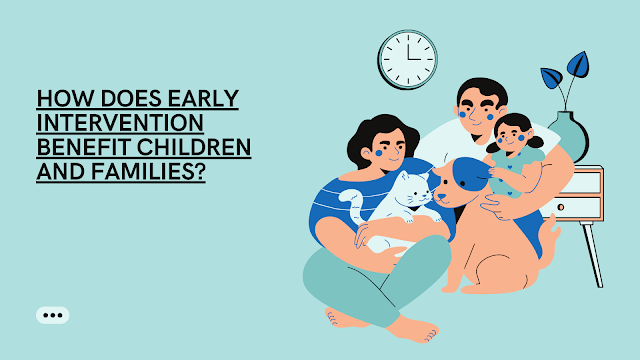How Does Early Intervention Benefit Children and Families?
The first few years of a child’s life are vital for their healthy development, as these years help shape the child’s behavioural and socio-emotional abilities, physical health and cognitive functioning in foundational ways.
However, many children face a variety of stressors or obstacles in these critical years that have the potential to compromise their developmental outcomes. For this reason, families need to act on any developmental concerns they might have about their children as soon as possible.
Early intervention is an umbrella term that refers to services and support initiatives for infants and toddlers with developmental disabilities or delays. It also encompasses activities that provide support for the parents and family members of such children. Depending on the child’s specific needs, an early intervention programme may involve a combination of physical therapy, speech therapy and other types of therapies.
Early intervention programmes help address developmental difficulties and encourage a child’s healthy development through their formative years and beyond. The following are among the most salient benefits of early intervention for children and their families:
Improves the Child’s Developmental Outcomes
An early intervention programme that is targeted to address a child’s particular developmental needs can help shift their developmental trajectory in a healthy and positive direction. Most of the time, early intervention focuses on supporting four fundamental aspects of child development:
Physical Health
Good physical health enables and supports positive growth in all other areas of a child’s development. Hence, early intervention activities focused on physical development may aim to enhance birth outcomes, reduce the child’s risk of contracting infectious diseases or mitigate the effects of any present physical disabilities.
Cognitive Abilities
Examples of essential cognitive abilities include speech, literacy, writing, numeracy and logical problem-solving. Children who develop these abilities at a healthy pace and can utilise them at high levels are likely to succeed both at school and professionally. While children are born with many of the competencies that help them develop these skills, the families, communities and greater societies they are part of can also shape their capacity to learn early in life.
Early intervention activities focused on cognitive development may aim to facilitate the timely growth and progression of particular cognitive skills, improve children’s performance during standardised testing or drive general academic achievement. They may also include activities that encourage children to pursue higher education or productive employment later in life.
Social and Emotional Capacities
Social and emotional development typically encompasses children’s ability to recognise their own emotions and those of others. Other important developmental milestones in this area include the formation of healthy self-esteem, the ability to address negative emotions constructively and the ability to resolve interpersonal conflict. Positive socio-emotional growth helps children form good relationships with their family members, teachers and peers. It also lessens their chances of developing depression, anxiety and other mental illnesses.
Early intervention activities focused on social and emotional development may focus on improving children’s confidence and self-esteem or on encouraging cooperation, sharing, collaboration and other examples of pro-social behaviour. Initiatives meant to reduce children’s risk of developing clinical mental health problems also fall under this area.
Self-Regulation and Behaviour
The ability to regulate their own behaviour enables children to succeed in the classroom and to form good interpersonal relationships with both adults and other children. Impulse control and attentional control are two examples of essential self-regulation and behavioural skills children must learn in their early years. Avoidance of problematic or disruptive behaviours such as throwing temper tantrums, yelling and engaging in physical violence is also a sign of healthy behavioural development.
Many studies have shown that poorly developed behavioural and self-regulation skills may lead children to engage in criminal or antisocial activities in their teen years or in adulthood. In light of this, early intervention programmes focused on behavioural development may aim to reduce aggressive or violent behaviour at school or during play.
Likely to Be More Effective than Later Interventions
The neural circuits or connections in children’s brains are at their most adaptable in the first three years or so of life. These connections form the basis for the child’s physical and mental health, learning abilities and behaviour. A child’s neural circuits also become more difficult to alter over time, which is why early intervention is usually better able to address developmental delays than interventions initiated later in life.
Helps Families Meet Children’s Needs
Raising a child with developmental difficulties can be fraught with physical, emotional and economic difficulties for any family. Early intervention enables parents and other families to understand their children’s needs from a young age and determine the best ways to address those needs in the years to come. Access to the proper knowledge and help from trained professionals places families in the best position to help children in need of specialised support.
In summary, it’s always a good idea for parents with concerns about their children’s development to seek developmental screenings and professional support as soon as possible. Early intervention makes a real difference for children with developmental delays and helps secure the best possible outcomes for them and their families.







No comments